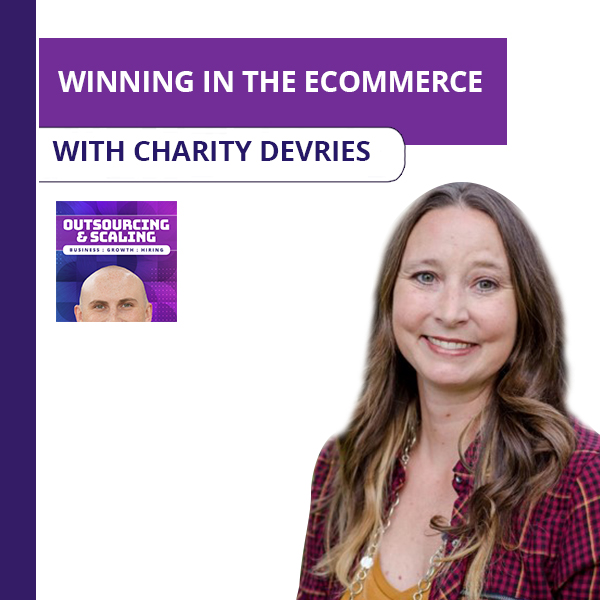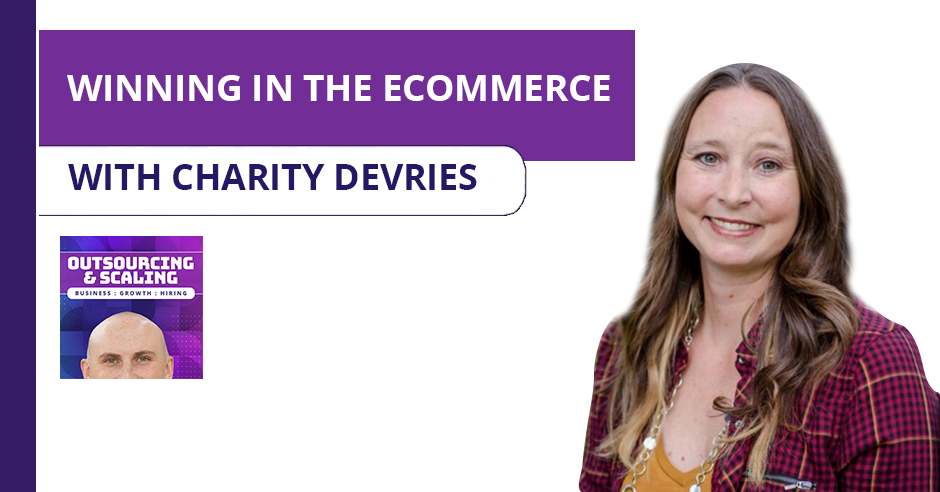


We live in the age of the boom of the eCommerce industry and all that entails. Slowly but surely, more and more businesses are exploding in the eCommerce sphere, and keeping up is a matter of making sure that you’re focusing what you need to focus on and delegating what you must. Nathan Hirsch is joined by Charity DeVries, a “momtrepreneur” with a passion for eCommerce. Charity shares her experience starting out in eCommerce, and the process of expanding the business and even outsourcing some of the tasks that need to be done. If you’re looking to get a headstart on eCommerce, this episode is for you.
—
Listen to the podcast here:
[smart_track_player url=”https://www.podetize.com/wp-content/uploads/fileuploads/11-5b145ef137b51b3d1af0633e9305c43d/02/2020/0ec971ff73a66ca4e844f90d8d747311.mp3″ title=”Winning In The eCommerce With Charity DeVries” artist=”Nathan Hirsch” image=”https://freeup.net/wp-content/uploads/2019/04/OAS.png” ]
Download the audio file here.
Winning In The eCommerce With Charity DeVries
My guest is Charity DeVries. Charity, how are you doing?
Nathan, how are you?
I’m doing great. I’m excited to talk to you. I know we’ve connected before. You’re heavy in the eCommerce space. For those of you that don’t know, Charity is a momtrepreneur who is passionate about eCommerce and helping others. While running successful eCommerce and consulting businesses with her husband, Ben, she is also an active volunteer with the local school district, often helping with entrepreneurship programs. They have two kids. They love traveling the US in their motor home and they couldn’t do it without great VAs. We’re going to talk all about that. First, let’s take a gigantic step backward. What were you as a kid growing up? Were you a rebel? Were you a straight-A student? Did you always know you wanted to be an entrepreneur?
We’ve done a lot of the personality type assessments and things like that. I am more of a “play it safe, let’s not push the envelope too far” person. Entrepreneurship was something that was never ever on my radar. It was a scary proposition. My husband, who is an entrepreneur at heart, loves that. I wouldn’t say he loves risk, but I would say that he loves pursuing something that’s new and different. When he first came to me a few years ago and had this idea of like, “We should start a business and we should be entrepreneurs,” I was not on board with that at the time because that’s not my comfort zone.
It was hard for me to think about getting out of my comfort zone. I went through high school and college with the whole thing of, “We’re going to get a job and do this thing like everybody else.” My husband would ask, “Listen to this podcast. Check out what this family over here is doing.” It opened up my world to be able to see and understand that there is so much more that is available if we’re willing to look at this thing of entrepreneurship and at this thing of having a business that we can run online. That’s when my paradigm started shifting. I started looking at that a little bit more seriously as like, “This could maybe be a viable option for us.”

Walk us into that first few years of being an entrepreneur. What was that like?
Quite frankly, I was still scared. I was borderline mad because those first few years felt we were not gaining any traction as far as making money. We did do our business intentionally in the sense of it was an endgame to get my husband out of his day job. I was a stay-at-home mom at the time. I had a few things going where I did some social media management for some businesses and stuff from home, but it was an endgame to get him out of his day job so we could be 100% free essentially. I was frustrated because we were taking in all of our profits and we were investing them back into the business so that we could grow the business faster. It was frustrating for me at first because we aren’t making any money. We were but it was being reinvested. I didn’t see it coming back into the bank account where it was staying in the account for very long. Those first few years were frustrating for me. It was after that where we hit that tipping point of like, “This train is starting to gain some momentum and now we’re moving at a decent pace,” whereas it felt like nothing was happening in that first couple of years.
Talk to me about your first hire. What was that like?
That’s another thing. The concept of outsourcing to me was super foreign. Some families grow up and maybe they hire the neighbor kid to mow the lawn or they hire somebody to clean the house or something like that. That was not how I grew up. That paradigm was never thereof if I hire this person to do this job, which frees up my time to pursue something else that is either more financially beneficial or more beneficial for me in general. I was talking to my husband that my relationship, even with my dad growing up, wasn’t as tight as it was with my mom because my dad was always working. That whole concept of, “Maybe if I hire somebody to do this, I could have more of my time freed up.”
It was this thing where I had to change my paradigm of that first hire is going to cost us money every month. Even though it wasn’t a significant amount, still in my mind, I’m like, “Why are we paying somebody to do this when we could do this ourselves and keep that money?” It took a while to make that transition into, “Here’s the deal. If we have this VA do this for us, then that frees up our time to be able to push some other things forward that at the end of this whole process, it’s going to help us move forward in our business.”
What lessons did you learn right away from the beginning? I learned a ton that first year, even in the first five years of hiring. Are there any lessons that stick out?
The very first person that we hired as a VA, this is where it got me. We were at Disneyland in California with our kids. It’s the very first time we’d ever been to Disney with our children. There were some things that we had with a particular client and it was some work on the website, etc. Long story short, we’re in the middle of Disney and there’s this stuff that’s semi-emergency situation. Instead of this whole thing of we have to go back to the hotel, we have to get out the computer and we have to get all this done, we sent our VA a Skype message and say, “Can you jump on this and make sure that this and this get done?” We’re able to go on with our day at Disney. It didn’t cost us that time that it could have cost us with our kids and with our family had we not had a VA that was onboard with us already. It just took a Skype message to say, “This is what’s going on. Can you please make sure that this gets fixed? Let us know if you have any problems.” That was that first a-ha moment of, “This is amazing.” If I didn’t have that, it could have cost me some precious memories with my kids on their first trip to Disney. You don’t want to miss out on that.
It’s the freedom that every entrepreneur wants. You go into entrepreneurship being like, “I’ll work my own hours and I’ll have my freedom,” then you quickly realize that you have less freedom. It takes someone to realize you have to hire, to delegate, to automate and you still have to be able to get away from the business. If you can’t ever step away from the business, why are you doing it? What’s the end-goal? Would you agree?
Yeah, I would totally agree with that. That’s a borderline trap that entrepreneurs fall into. They think that they’re going to do what they love and then they get caught up in the day-to-day. They sometimes start to hate the business because they’re not doing what they love. They’re doing the day-to-day operations instead of outsourcing that to somebody that’s more capable. Even if it’s somebody that’s as capable by getting it off their plate so they can go back to doing what they love and why they started this business in the first place.

What about any bad hiring experiences? Are there any that stands out for you?
We’ve had a couple of hiring experiences where the person that we hired was a little bit misleading in the sense that they indicated that they had some skillsets but they did not. It was like, “Why is this not getting done?” Following up with them was like, “This needs to get done,” and it’s crickets on the other end, only to find out they didn’t know how to get it done. They weren’t upfront with us with that process. That can be somewhat problematic if you don’t have a good vetting process.
What advice would you give to Amazon sellers, eCommerce sellers? I get asked this question all the time like, “Who should your first hire be?” I’ll say, “It depends. Are you stuck in the day-to-day? Do you have projects that need to get done? Do you need experts?” What do you normally tell eCommerce sellers?
What we normally tell eCommerce sellers is you should start with the things that you feel are going to move your business forward the most. We go back to the Pareto Rule, which is 20% of what you do is going to bring you 80% of the results. A lot of people get stuck with doing 80% of their activity for about 20% of their results. We try to look at that and coach people and say, “Find the thing that’s going to move your business forward the most and where maybe you don’t have the knowledge.”
For a lot of Amazon people, one thing that we see sucks their time that can easily be outsourced is the day-to-day account management. Looking at your account, looking at your conversion rate on your Amazon listings, making sure you don’t have any listings that have gone inactive or suppressed, checking your inventory levels, all of these things can easily be done by a VA. That VA can report back to you and let you know if things are falling below a certain threshold or if there’s any account alerts or things like that. That frees up more of your time to pursue those things that are going to be more needle-moving in your Amazon business.
If there’s anything that you feel you don’t understand or have a good grasp on, and one of the biggest areas we see there is the Amazon pay-per-click or the Amazon sponsored ads where people don’t understand it. It will turn into a runaway train very quickly if it is not managed. That costs a ton of money if it turns into a runaway train. That’s another area that we see with a lot of Amazon sellers that they need help in. We advise getting help there. We don’t even manage our own ads anymore. We have a VA that helps us with that who’s an actual pay-per-click expert because we do not understand how to do it. We do know all of the nuances, but the time-consuming piece is not something where we feel the best use of our time spent on Amazon pay-per-click management. That’s where we’ve brought in an expert that can do that for us and free up our time.

That leads me to my next question. It’s one thing to hire someone for a system or a process you have down. You can teach it to them. What tips do you have going about hiring something that you don’t understand or you’re not good at? It could be PPC, Facebook ads or overall building brand social media channels. The average Amazon seller or the average entrepreneur is only good at 1 to 3 things. How do you hire for things that are outside of your core competency and still do it at a high level?
We want to know that that person either has been vetted. A lot of times, we will maybe even ask around like, “Who do you recommend for this sort of thing?” The other thing that we to do is we ask people in that particular realm if it’s somebody who you are not super familiar with if they don’t mind giving us references for other clients that they’re either currently working with or have worked with. We can check on those references and make sure that whoever they worked with or are currently working with can vouch for those skills and say, “This person is the real deal.”
You consult a lot of businesses. What are some of the common mistakes that you haven’t touched upon yet that you see other entrepreneurs or other Amazon sellers are making?
We coach primarily Amazon sellers. We also do some general business coaching for small businesses. The most common mistake that we see is people get caught up in the overwhelm of everything that they forget the basics. The basics with Amazon are two things and that is one is making sure that you’re visible. Making sure your listing is visible for a different variety of search terms and keywords. Two is making sure that your listing is converting. If your listing is visible but your pictures are horrible, your description does not make any sense, people look at your product and your listing and they are left with questions in their head, it’s not going to convert into a sale. Over and over what we see the biggest mistake people make is they forget to focus on those two things: making sure that they’re visible and making sure that their listing is converting. If they can focus on those two things, they’re going to be successful sellers.
Can you talk a little bit about working with your husband? I know you’re a mom and you’re a wife. That’s a little far removed from what I’m doing. I tried to keep my fiancé and everyone else far away from my business as possible and not overlap it and have that separate. How do you balance all that? How do you take time to get away from the business and still hang out and spend time with the people that you’re in the trenches with every single week?
It’s definitely a challenge. I’m not going to say it’s not a challenge. It’s interesting because we started working together as a business more out of necessity because when we started this business, my husband was still working a 9:00 to 5:00-type of job. A lot of it falls on my shoulders to do a lot of the ancillary startup things like product research, supplier outreach, ordering samples and all of those beginning stages. A couple of things that keep us married still and keep our family to where we have a good family dynamic is when we try to focus on what are our strengths and operating in our strengths. Certain things that are my strengths are some of the admin tasks, some of the face-to-face people stuff. I like to joke around about there’s a little scene from a movie where the guy’s like, “I’m a people person, I work with the people.” That’s more me.
I’m an extrovert and my husband is an introvert. We try to operate in our strengths and that way, neither one of us feels worn down with what we’re doing or drained with what we’re doing. We also outsource a ton now that we didn’t outsource at the beginning. That is the key to being able to getaway. For example, we were up in the mountains for five days in an area where there was a very spotty cell service. As far as getting data in on our phones, it was nearly non-existent but all is fine. Things are still moving forward because we have a whole team of outsourcers that are getting those things done. Even when we’re out of pocket and usually if we know we’re going to be out of pocket, we tell our team that we’re not going to be easily reachable. If there’s an emergency, text me or whatever because we could at least still get texts and occasionally make outgoing phone calls.
Those are the times where we try to getaway. The other thing too is we try to set aside the weekend as a, “We don’t work for profit day.” Whether it’s getting yard work done around the house or whatever it is that we do. We try to make sure that our weekend still stays a weekend and that we don’t end up working on the weekends because that’s an easy thing to fall into. We see a lot of people get burnt out when they don’t do that. You have to be intentional. You have to create some boundaries. We work from home. The other thing too is we have both of our offices downstairs in the basement so we can leave our laptops in our office. That way, when we walk upstairs in the living area or in our bedroom area, we’re not tempted to pick up the laptop. We try to have that as a little bit of a boundary and a degree of separation.

Where can people find out more about you and what are you most excited about going for the rest of the year?
If people want to learn more about us, our website is PhysicalProductPros.com. It tells you a little bit more about us and what we do. One thing we’re super excited about is when we started our Amazon business, we started with our first brand. We started our second brand. One thing we’re passionate about is we have a 40-foot motor home that we travel around the US in the summer. We RV full-time in the summer because we can work remotely. We love this business for that. What we’re probably most excited about is we started our second brand and it’s all wrapped around the camping and the RV niche. We’re super excited and passionate.
We started our own YouTube channel where we’re putting out videos of all the places we went in the summer and some campground reviews and things like that. We’ve got a bunch of content in the coffer that we filmed over the summer that we’ve got on the docket to continue to do more YouTube videos and stuff like that throughout the winter and the fall. That’s the thing that pumps me up the most, is being able to continue to produce that content. All of them wrap around our secondary brand. We’ve got some products on Amazon in that brand. It’s a perfect marriage of taking what we’re passionate about and being able to monetize it as well. We’re super stoked about that.
When I was selling on Amazon, I was selling baby products and I was not passionate about baby products. Whenever you can find a brand that you’re passionate about and make money on it, it’s awesome. Thanks for coming on and have a great rest of the week.
Thank you.
Important Links:
- Charity DeVries
- PhysicalProductPros.com
- YouTube – Physical Product Pros
About Charity DeVries
 Charity is a “momtrepreneur” who is passionate about eCommerce and helping others. While running successful eCommerce and consulting businesses with her husband Ben, she also is an active volunteer with their local school district, often helping with entrepreneurship programs.
Charity is a “momtrepreneur” who is passionate about eCommerce and helping others. While running successful eCommerce and consulting businesses with her husband Ben, she also is an active volunteer with their local school district, often helping with entrepreneurship programs.
They have two kids and love traveling the U.S. in their motorhome.
